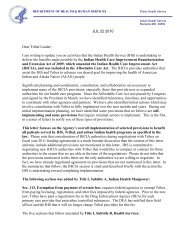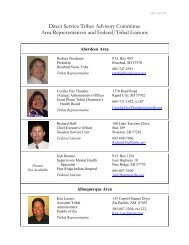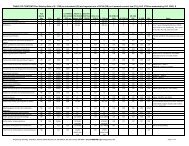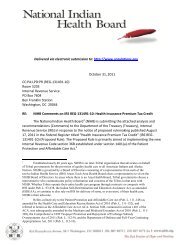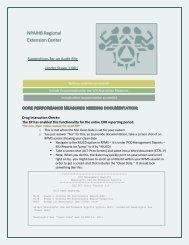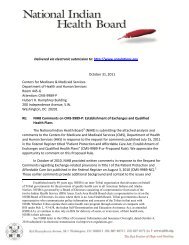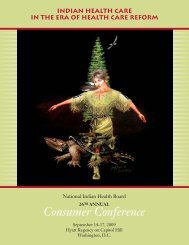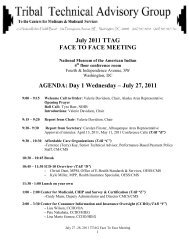mmpc - National Indian Health Board
mmpc - National Indian Health Board
mmpc - National Indian Health Board
You also want an ePaper? Increase the reach of your titles
YUMPU automatically turns print PDFs into web optimized ePapers that Google loves.
v.7, 2012‐09‐23a<br />
1997. The provision amended section 1932(a)(2)(C) of the Social Security Act and is codified at 42 U.S.C. 1396u-<br />
2(a)(2)(C), with regulations issued at 42 C.F.R. § 438.50(d)(2).<br />
12<br />
See discussion in the Final Rule at 77 Fed. Reg. 18383; and see 45 C.F.R. § 155.315(h) “Flexibility in information<br />
collection and verification” at Final Rule, 77 Fed. Reg. 18455.<br />
13<br />
Again, the range of <strong>Indian</strong>-specific eligibility determinations include the cost-sharing and monthly enrollment<br />
protections in the individual market through an Exchange, eligibility for Medicaid cost-sharing and managed care<br />
protections, and the exemption from penalties for AI/AN not securing minimum essential coverage.<br />
14<br />
This issue is of concern under state-based Exchanges as well as the Federally-facilitated Exchange (FFE).<br />
15 While these regulations and other materials demonstrate that the statutory definitions can be reconciled, mere<br />
restatement of the statutory language is not sufficient to facilitate accurate eligibility determinations.<br />
16 See Federal Register, Vol. 75, No. 148, August 3, 2010, Request for Comments, “Planning and Establishment of<br />
State-Level Exchanges,” Section G. Enrollment and eligibility, Office of Consumer Information and Insurance<br />
Oversight, HHS, page 45588, which includes “additional requirements to assist Exchanges by… simplifying and<br />
coordinating enrollment in the Exchanges, Medicaid and the Children’s <strong>Health</strong> Insurance Program (CHIP).”<br />
17 77 Federal Register 18346.<br />
18<br />
For example, on October 30, 2000, President Clinton signed into law H.R. 2883, the Child Citizenship Act of<br />
2000. The new law, Public Law 106-395, amends the Immigration and <strong>National</strong>ity Act (INA) to permit foreign-born<br />
children — including adopted children — to acquire citizenship automatically and immediately if they meet certain<br />
requirements, rather than having citizenship conferred only after an application process is completed. This law<br />
became effective on February 27, 2001.<br />
19<br />
ACA § 1311(c)(6)(D) referring to section 4 of the IHCIA and codified at 25 U.S.C. 1603; ACA § 1402(d)(1) and<br />
(2) referring to section 4(d) of the ISDEAA and codified at 25 U.S.C. 450 et seq.; and ACA § 1501(b)) creating<br />
IRC § 5000A(e)(3) which refers to section 45A(c)(6) of the Internal Revenue Code.<br />
20<br />
The Internal Revenue Code.<br />
21 The ISDEAA, Pub. L. 93-638.<br />
22<br />
The special monthly enrollment periods are described in 45 C.F.R. § 155.420(d)(8). An AI/AN may enroll in a<br />
health plan or change from one health plan to another one time per month.<br />
23<br />
See ACA § 1402(d)(1) and (2). The additional cost-sharing protections are described in 45 C.F.R. § 155.300(a)<br />
and (b)). Under ACA § 1402(d)(1), the cost-sharing protections encompass a waiver of all cost-sharing for an<br />
AI/AN individual whose household income is not more than 300 percent of the Federal poverty level. Under ACA §<br />
1402(d)(2), there is no cost-sharing for an AI/AN individual of any income level when furnished an item or service<br />
directly or through referral by an <strong>Indian</strong> <strong>Health</strong> Care Provider. “<strong>Indian</strong> <strong>Health</strong> Care Providers” are comprised of the<br />
<strong>Indian</strong> <strong>Health</strong> Service, Tribes and tribal organizations, and urban <strong>Indian</strong> organizations. Collectively, these entities<br />
are also sometimes referred to as “I/T/U”. The <strong>Indian</strong> <strong>Health</strong> Service means the agency of that name within the U.S.<br />
Department of <strong>Health</strong> and Human Services (“HHS”) established by IHCIA § 601 (25 USC §1661). The terms<br />
“<strong>Indian</strong> tribe,” “tribal organization,” and “UIO” have the meaning given those terms in IHCIA § 4 (25 USC §1603).<br />
The issuer of a health plan shall not reduce the payment to an <strong>Indian</strong> <strong>Health</strong> Care Provider by the amount of any<br />
cost-sharing that would be due from an AI/AN but for this provision. The Secretary of HHS is to pay to the health<br />
plan the amount necessary to reflect the increase in actuarial value of the plan required by reason of this provision.<br />
24<br />
The determination of eligibility for this exemption is not within the functions of an Exchange. The IRS has<br />
responsibility for implementing this <strong>Indian</strong>-specific protection, which is found in IRC § 5000A(e)(3) and waives the<br />
penalties for AI/ANs who do not maintain minimum essential coverage, although the IRS may rely upon an<br />
Exchange’s determination of who is <strong>Indian</strong> for those individuals who have been determined to be “<strong>Indian</strong>” for<br />
purposes of Exchange-related provisions.<br />
25<br />
Wording contained in IHCIA Sec. 4(14) and ISDEAA Sec. 4(d), except that the double underlined words (“or<br />
group”) are only contained in IHCIA Sec. 4(14).<br />
26<br />
See TTAG Analysis, page 6.<br />
27<br />
TTAG October 2010; NCAI Res. # ABQ-10-080, November 2010, NIHB Res. 10-01, October 2010; TSGAC<br />
February 2011; and NPAIHB, October 21, 2010.<br />
Northwest Portland Area <strong>Indian</strong> <strong>Health</strong> <strong>Board</strong> Page 14 of 16



